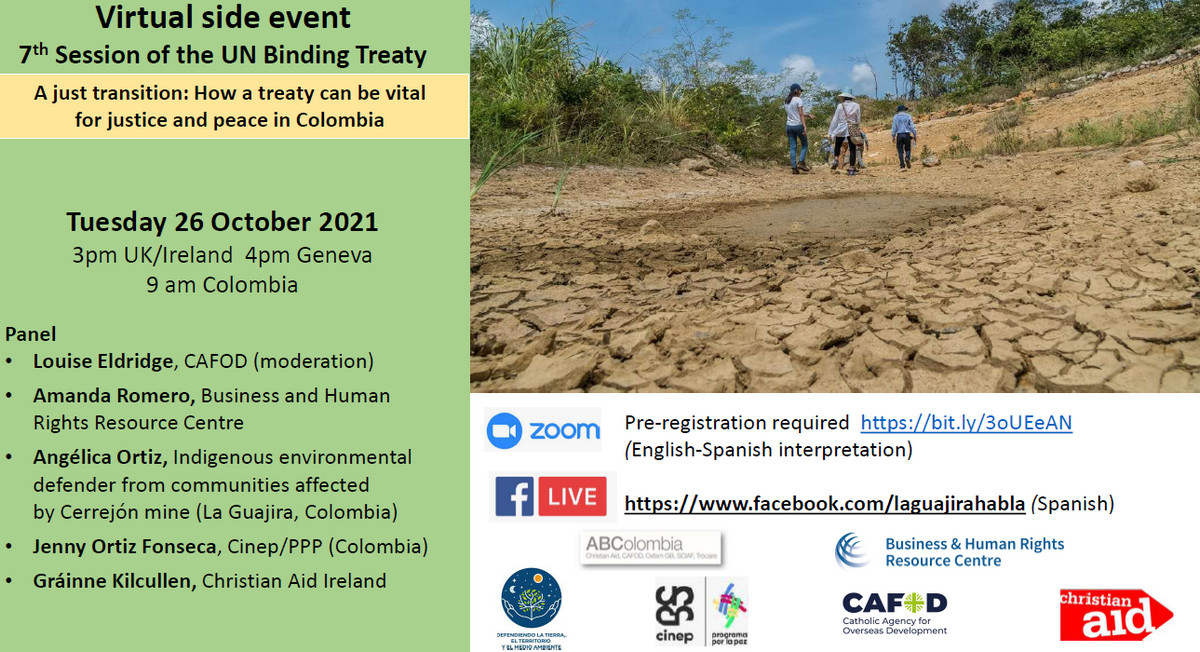A just transition: how a treaty can be vital for justice and peace in Colombia
7th Session of the UN Binding Treaty – Virtual side event via Zoom
3 PM UK/Ireland, 4 PM Geneva/Brussels, 9 AM Colombia
PRE-REGISTRATION REQUIRED HERE
This event will be transmitted live on facebook.com/laguajirahabla (Spanish only)
Languages: English & Spanish
Panel
- Louise Eldridge, CAFOD (moderation)
- Amanda Romero, Business and Human Rights Resource Centre
- Angélica Ortiz, Indigenous environmental defender from communities affected by Cerrejón mine (La Guajira, Colombia)
- Jenny Ortiz Fonseca, Cinep/PPP (Colombia)
- Gráinne Kilcullen, Christian Aid Ireland
Background
Cerrejón is the largest open-pit coal mine in Latin America and was jointly owned by subsidiaries of multinational mining companies BHP, Anglo American and Glencore up until June 2021 when BHP and Anglo American sold their interests to Glencore, who will be the sole owner of the mine by mid 2022.[1] For years, the mine has been severely impacting the rights and environment of indigenous, Afro-descendant and farming communities in Colombia, who are working to defend their human, cultural and spiritual rights and the environment.
More than ten court rulings and resolutions from the Colombian courts, the Environmental Ministry and other authorities have raised the negative impacts of the companies’ operations on communities’ right to health, water, a healthy environment, food security, adequate standard of living and active and meaningful participation in development – however, they have been inadequately implemented by Colombian authorities and companies have failed to fully comply with them.[2]Glencore is soon to be the sole owner of the mine, which has raised further concerns about accountability in the context of mine closures and about who and how the aforementioned rulings and resolutions will be implemented.
This event will feature testimony from local communities affected by the Carbones de Cerrejón Ltd mining operations and from civil society organisations supporting these communities. It will give visibility to the serious ongoing human rights violations in La Guajira linked to multinational enterprises – especially related to the vital right to water. It will make the case for urgent progression on the UN Binding Treaty to regulate transnational corporations, focusing in particular on:
- The need to address barriers to access justice and reparations faced by indigenous and Afro-descendant communities affected by coal mining operated by transnational corporations,
- The need to abolish legal frameworks that have allowed companies to sue the Colombian state for enacting public-interest legislation that disrupts their profits;
- The need for effective corporate accountability mechanismsin situations of conflict and to advance transitional justice, five years after a peace accord with the then largest guerrilla group FARC;
- The need to take a comprehensive approach to human rights, the environment and climate change and contribute to a just energy transition – particularly given that, during the last decade, more than half of the environmental conflicts associated with renewable energy projects globally have taken place in Central and South America.[3]
For further information and RSVP, please contact Lucy Jardine, CAFOD, ljardine(at)cafod.org.uk
____________________________
[1] Glencore snaps up BHP, Anglo stakes in Colombian coal mine https://www.reuters.com/business/energy/glencore-buy-out-jv-partners-bhp-anglo-colombian-coal-mine-2021-06-28/
[2] ABColombia profound concerns regarding Cerrejon’s lack of compliance with Court Rulings. – ABColombia
[3] In Colombia, Indigenous Lands Are Ground Zero for a Wind Energy Boom In Colombia, Indigenous Lands Are Ground Zero for a Wind Energy Boom – Yale E360

